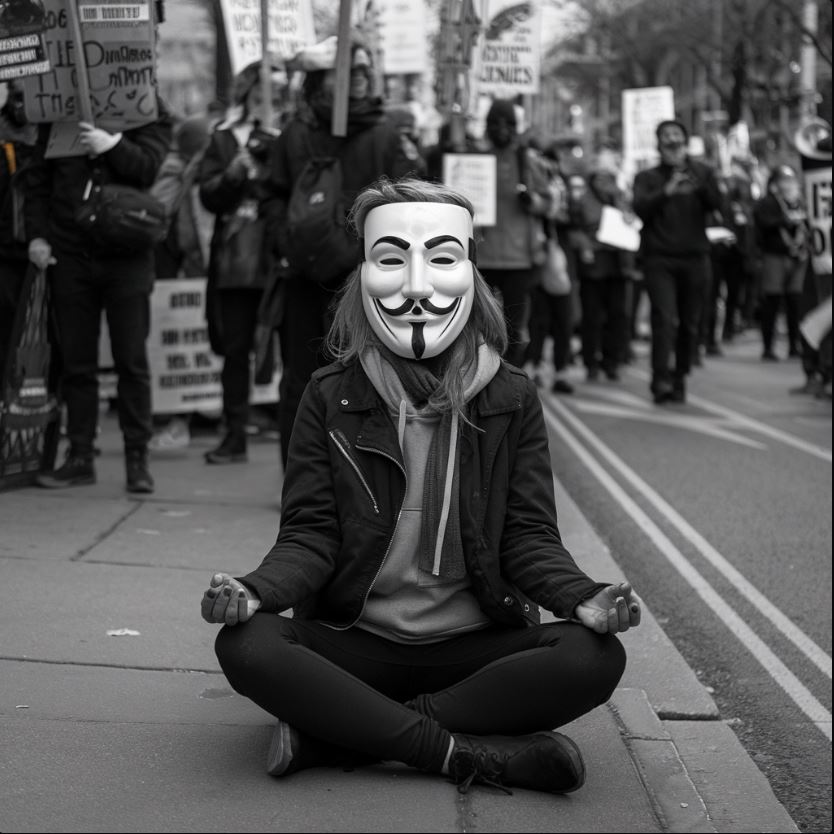Feminist Global Resistance will be posting a series of articles on techniques and safety tips for activists.
To all activists, if you are planning to “dance the streets”, you must become knowledgeable of your needs and the needs of your comrades. Activism can be fun but it is serious business – take care of yourself and each other.
Our next article, “Activism – Staying well #OpMentalHealth”, was written in conjunction with Anon/Street Medics and other friends.
Self-care and the care of others is extremely important for activists. Remember, we are in this together so together we help each other.
As always: Be prepared for confrontation and keep it safe out there!

Activism – Staying well #OpMentalHealth
Protest and activism are physically, emotionally, spiritually, socially, and politically intense. Moment to moment, it can shift from being exceptionally enriching and energizing to exasperating and exhausting (The “highs” and “lows” of activism). One of the most effective ways to deal with the disruption these emotions can cause is to establish and sustain a collective, holistic space that nourishes people’s individual needs and recognizes them as important, unique elements of a dedicated, diverse, and active community. Below are some ideas:
- SCHEDULE: Schedules can reduce mind clutter and stress, creating more space for engaging in activities with depth and calmness and keeping people “present” (not lost in past or future tripping). If you’re here to participate in particular actions, a schedule can help you feel more prepared, secure, and content.
- SLEEP: If and when things go down, being well rested will give you a better chance of being resilient. Seven hours of sleep vs. two really can make all the difference in whether or not an action is successful. Think about what you need to sleep soundly (warm clothing, blankets, earplugs, eye cover, sleep aids, etc.), and share these with each other. Collectively take shifts to ensure that you are all individually nourished by rest (especially important in occupations).
- EAT & DRINK: Stay hydrated, eat as well as you can, and keep your blood sugar up (low sugar, no/limited caffeine). Sharing meals together is a great way to build friendships and community. Make room for high protein and energy snacks for long marches. If one is planning an occupation (Autonomous zones, holding buildings or camping), have runners outside to provide food and supplies (water, coffee, tea, snacks) and make sure you have sufficient supplies inside the zone. Occupations can be short or long so be prepared. Marches can last hours and travel miles so plan ahead – people can be stationed along the route to offer supplies to their fellow activists on large marches but smaller ones, you may need to pack your own.
- SUPPORT: Build and stay connected to your own unique, creative support system of healing and inspiring people, things, spaces, and activities—both nearby and farther away. Support each other to take the time out to do this; nurturing individual needs contributes positively to the collective.
- HERBS & MEDS: Keep up with any herbal or medication regimens you may be on. Keep your prescription bottle on you, ID, and preferably a note from your doctor. This will increase your chances of getting to take your meds if you are arrested.
- STAY EMBODIED: Your body is a significant site for processing (potential) stress and trauma. Take care of it, listen to it, and nourish it with touch and movement. Stretch; massage your shoulders, hands, feet, and/or face; take slow, deep breaths; notice the tension in your body, and let it go as you exhale. For some people, embodiment may also mean trying to avoid excessive alcohol and drugs. While people will make these decisions for themselves, it is important to recognize that intoxication can negatively affect protests by disrupting our connections with our bodies and each other.
- PLAY: Part of decompressing and dealing with trauma is remaining alive. In addition to dealing with the serious matters at hand, it helps to have fun. Done with sensitivity, laughter is a shiny way to heal, gain perspective, and connect with one another. Please remember for teh lulz. Building a spirit of playfulness, poetics, and performance into your space and actions also supports sustainability and solidarity. Music, dance, sing, play – activism is serious business but it doesn’t have to be a burden. Play brings us to a place of ease and easiness with each other. Join in and dance with your comrades- they are your family.
- TALK AND LISTEN: Being prepared before things get hectic can be helpful. Talk with people about what’s difficult for you and what helps you when things get rough. Actively create a supportive space for others to do the same. This kind of communication happens on multiple levels. Stay tuned in to each other, listen, reflect, and ask questions. We can all learn and grow from each others’ experiences.
- SPACE: We are not separate from our physical surroundings. Thoughtfully building this space will help to calm, cleanse, and invigorate your emotional well-being and promote a sense of inclusion and community. Collectively making a space is also a great way to build connections, begin conversations about our overlapping and diverse needs and aspirations, and get creative!
- CONNECT: It is important to realize that you are not alone. Take time to build friendships with your fellow activists and support each other. Draw connections between what you are experiencing on a personal level and the big picture—experiences of your fellow activists, broader movements, everyday injustices lived by diverse communities, struggles for resistance and change by other groups across time and place, nature and the Earth, spiritual exploration, global revolution—you name it! We are only limited by our egos; Become open to the world around you.
Stay safe!
Love and solidarity!


